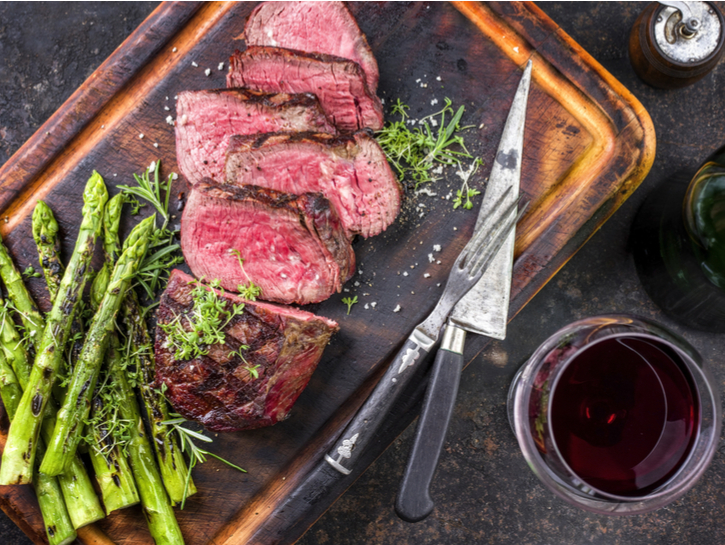What Is Wagyu?
Wagyu is what its name roughly translates to mean — “Japanese cow.” There are four breeds of Japanese cow: Japanese Black, Brown, Polled and Shorthorn. The Japanese Black breed makes up 90 percent of all Wagyu beef. The cows produce what is regarded as some of the finest beef in the world because of its melt-in-your-mouth richness.

Kankitti Chupayoong/Shutterstock
How Is Wagyu Different From Other Beef?
What separates Wagyu beef from other types is its intricate marble pattern, called “shimofuri,” which is made by the meat’s evenly distributed fat. This marbling gives the meat an impossibly rich flavor that elevates Wagyu to be one of the most desired meats in the world.
Wagyu cattle are bred with one goal — to achieve supreme, succulent flavor. The cattle are derived from cows native to Asia and crossbred with European breeds in the 1880s. The four strains produced are the modern-day Wagyu.
Because Japan has a lack of suitable pastures for livestock, the Wagyu cows live an inactive life in small pens, where they are hand-fed specialty feed in a lengthy fattening process. This stagnant lifestyle, along with the cows’ genetic makeup, produces the marbling pattern of the fat.
Not only is Wagyu beef tender, the fat is unsaturated and the meat is high in Omega-3 and Omega-6 fatty acids, so it is healthier than other varieties of beef as well.

Ken Kojima/Shutterstock
How Expensive is Wagyu?
In a word, very. An 8 oz steak of premium Wagyu beef can start at $60, with other cuts reaching prices in the thousands.
Wagyu beef is so pricey because it is so top-notch, and the process to raise the cattle is so complex and strict. Cows used for breeding produce calves that are fed a special milk replacement until they are weaned and sent to fattening farms where they are tended to for upwards of 30 months, which is longer than normal beef-producing cows. It’s a timely and meticulous process.
You can tell you’re enjoying true Wagyu beef because its buttery taste and melt-in-your-mouth tenderness is so different from regular beef. If you were still unsure about the beef’s origins while evaluating its marbling, Wagyu is immediately recognizable once you take your first bite.

hungryworks/Shutterstock
What Is The Best Way To Prepare Wagyu?
Wagyu beef should be cooked medium-rare. If cooked for too long, the marbled fat within the meat could melt away in the heat. If not cooked for long enough, the meat can resemble “eating a stick of butter” because of its supreme softness, Troy Lee, chef de cuisine at Oak Door Steakhouse in Tokyo, told CNN.
But steaks are not the only way you can indulge in Wagyu. Japanese dishes such as sukiyaki and shabu-shabu both use thin cuts of beef in their preparation, and using Wagyu is a natural choice.

hlphoto/Shutterstock
